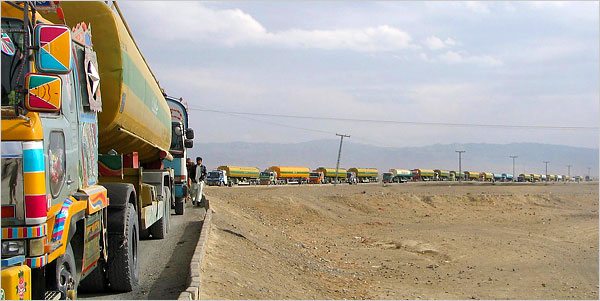NATO has reached agreements with Kazakhstan, Kyrgyzstan and Uzbekistan to allow troops and equipment to transit these Central Asian nations to and from Afghanistan, NATO’s secretary general said yesterday.
“These agreements will give us a range of new options and the robust and flexible transport network we need. I thank all three partner countries for their support,” Rasmussen told reporters during his monthly briefing from NATO headquarters in Brussels.
“NATO will continue to actively engage with Afghanistan’s neighbors,” he added, “to build wider support for the country’s stability.”
During a briefing at the Pentagon today, spokesman Navy Capt. John Kirby said the United States also has bilateral agreements with the three nations through the Northern Distribution Network, to move goods in and out of Afghanistan.
“We are very appreciative for those arrangements and continue to use them,” Kirby added.
Such ground routes are needed to supply the war in Afghanistan and will be critical as the combat role of NATO’s International Security Assistance Force comes to an end in 2014, and troops and equipment begin to make their way home.
Shorter routes through Pakistan have been closed since November, after a cross-border incident involving NATO troops in Afghanistan mistakenly killed 24 Pakistani soldiers. Defense Department and NATO officials have said that negotiations are underway with Pakistan to reopen the routes.
Kirby said defense officials “do believe having the ground gates open at Chaman and the Torkham gates [on the border between Pakistan and Afghanistan] for the flow of coalition traffic in and out of Afghanistan remains valuable.”
He added, “And we continue to be in discussions with our Pakistani counterparts about trying to get those gates open and, in general, trying to improve the relationship with Pakistan writ large.”
In Brussels, Rasmussen said he invited Pakistan President Asif Ali Zardari to last month’s NATO summit in Chicago, during which “President Zardari confirmed that it is his clear intention, it is the intention of Pakistan, to engage positively in finding solutions to the conflict in Afghanistan.”
The secretary general declined to comment on details of the negotiations with Pakistan, adding, “I’ll just reiterate that I still hope that a solution can be found in the very near future.”
At the same time, he said, “we actually concluded a number of very important transit agreements at the Chicago summit and of course that will contribute in a very positive way to our operation in Afghanistan as we gradually wind down our combat operation towards the end of 2014.”
NATO already has a reverse transit arrangement with Russia, Rasmussen added, “and the fact that we have now concluded … three concrete transit arrangements with Central Asian countries at the Chicago summit will make the use of the Russian transit arrangement even more effective.”
The secretary general also declined to comment on details of the Central Asian transit agreements but said, “…We have concluded agreements that are of mutual satisfaction of the involved partners.”









